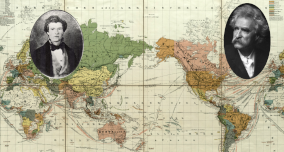Character
Malaga, Spain, Oct. 17.
The Captain & I are ashore here under guard, waiting to know whether they will let the ship anchor or not. Quarantine regulations are very strict, here, on all vessels coming from Egypt. I am a little anxious, because I want to go inland to Granada & see the Alhambra. I can go on down, by Seville & Cordova & be picked up at Cadiz. Later—We cannot anchor—must go on. We shall be at Gibraltar before midnight, & I think I will go horseback (2 long days) & thence by rail & diligence to Cadiz. I will not mail this till I see the Gibraltar lights—I begin to think they won’t let us in anywhere.2
11.30 PM—Gibraltar.
At anchor & all right, but they won’t let us land till morning—it is a waste of valuable time. We shall reach New York middle November.
Yrs
Sam
The Spanish port officials at Málaga required a seven-day quarantine for any ship—regardless of its bill of health—arriving from another Mediterranean port (Charles C. Duncan 1867, entry for 17 Oct). Julia Newell, in a letter to the Janesville (Wis.) Gazette, remarked on “the absurdity of quarantining a ship with a perfectly ‘clean bill of health,’ and on board of which for five months there had been no disease more serious than seasickness,” adding that since Gibraltar was “regulated in its affairs by English good sense,” the passengers were allowed to land there (Newell 1867). Since Málaga was the only Spanish port from which Granada could be easily reached, passengers who were intent on seeing the Alhambra, but unwilling or unable to pursue the alternative Clemens mentioned here, were thereby prevented from seeing it at all.
SLC to Jane Lampton Clemens and Family, 13, 15, and 17 Oct 1867, Cagliari, Italy (UCCL 00151), n. 2.
